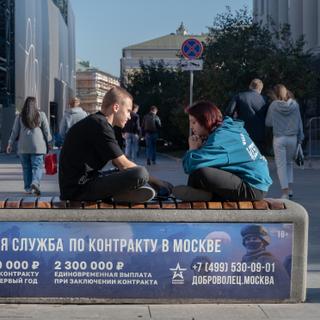


Ukraine and Russia's great race to recruit fighters
In DepthWith so many casualties on the battlefield, Kyiv and Moscow are facing a shortage of soldiers, threatening Ukraine's ability to sit at the negotiating table from a position of strength.
While the conflict in Ukraine has entered a new phase since November 5, when Donald Trump was elected US president, the sustainability of Moscow's war effort against Kyiv is the focus of much attention. While the Kremlin has completely reoriented its economy to serve its defense industry, to ensure its military endurance, particularly in terms of munitions, there is one resource that Russia – like Ukraine – is still struggling to ensure continuity of; its fighters. Observers worry that this pressure is contributing to Russian President Vladimir Putin's war of one-upmanship.
"Since the start of the war in Ukraine, time has been on Russia's side. Moscow has a larger population than Kyiv and a bigger economy. In a war of attrition, that counts," said Joris Van Bladel, a specialist in Russian military affairs and senior associate at the Egmont Institute in Belgium. "But Russia doesn't have unlimited resources either. So we're also currently seeing competition in the management of time," said Van Bladel, author of a book due in February 2025, entitled Land van het Grote Sterven. Hoe Rusland de Westerse Logica Tart ("The Land of Great Sacrifices: How Russia Defies Western Logic").
On both the Russian and Ukrainian sides, the number of dead and wounded is an extremely sensitive subject, and no precise figures have been released. But, according to a study published in November by the French Institute for International Relations (IFRI), these so-called "irreversible" losses – in other words, the dead, the missing and the seriously wounded – are steadily increasing. Between March 2022 and October 2023, Russian losses are said to have risen from 231 per day to over 600, or more than double. And, since November 2023, they have approached a thousand a day, according to Yuri Fedorov, author of the IFRI study, built from cross-checking open-source data. On December 4, Anna Tsivilyova, Russia's deputy defense minister, announced that the ministry carried out 48,000 DNA tests to identify missing soldiers.
You have 89.79% of this article left to read. The rest is for subscribers only.
